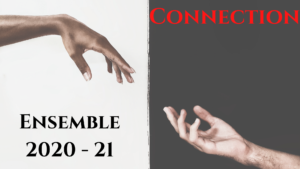“The Only Constant in Life Is Change.”– Heraclitus.
With the global pandemic we have witnessed this more than ever.
Work from home, school from home, which were once considered a luxury has become the need of the hour. With the uncertainty of how long the situation would last, it was essential to think of ways to not stop or pause or break the learning. More importantly, for our young learners, the formative years play a crucial role in moulding them and preparing them for what may come.
Pre-schooling, which I consider the most memorable years of any student, is a time of make or break!
An early learning classroom is the most delightful sight. Such a colourful and happy learning space. Welcoming the students into the space, discussing the ways we could make communication better for both them and the adults in the classroom is very important. Building ‘Essential agreements’ and not imposing rules in a classroom; fostering student agency is a significant part which sets the tone for the entire academic year in an IB school. This was all seamlessly possible at School, with the students being physically present in the space, interacting with their peers, encouraging peer learning and the young ones motivating and supporting each other in becoming a better version of themselves, with time.
With the virtual classrooms, devices being their peer, was it even possible to have the same classroom/school experience? Would this be effective enough? Well, there is no escape from reality. We had to ensure continual learning with a good and safe learning environment. The first year into the virtual classroom was definitely an eye opener and I was taken by awe with the way students responded. “More than us teaching children, they teach us more. Don’t they?“ I thought. The students have the ability to turn things around and change a challenge into an opportunity.
So the second year into the online world of education, we stepped up the game and aided in the fostering student agency, in line with the framework of our School: Svādhyāya: The AAIS Behavioural Framework. ‘Svādhyāya or Self-Study is a compound Sanskrit word composed of svā (स्वा) : meaning self + adhyāya (अध्याय): meaning study.
In our virtual classrooms, when exposed to speaking at the same time, over each other, leading to ‘chaotic talking’, our students realised that they wouldn’t be heard amidst this mayhem. So, they agreed to ‘Patiently wait for their turns’ to share what they have to. And not to forget, they also were ‘Good listeners’, because when they want to be heard, they must hear out others as well, right? Building the essential agreements starting from deciding on how to communicate in the group to exposing them to the ‘Learner Profile Attributes’ and the ‘Approaches To Learning’ was indeed a beautiful journey.
Nothing better than the simple tool of ‘Stories’ to encourage thinking and reflection. Using stories as tools to enter their world, our young learners were introduced to important skills of how to be good ‘Communicators’ and ‘Inquirers’. How to use their ‘Research Skills and ‘Self Management skills’ in doing what they do, was also all done through stories.
At this point we might have a question popping! What if they stop following the essential agreements? Yes! That is very probable. They did that as well, but, ‘Svadhyaya’ is all about self-reflection and self-discipline. ‘Reflection Routines’ helped them to track their own behaviors.
The Role of REFLECTION ROUTINES in our learning
Reflection routines are a major part of almost all learning engagements. Reflecting on what they have learnt, how they behave helps them to keep a check on themselves and work on being better or just being consistent the way they are.
To achieve this, to make them reflect upon their work, we started off with appreciating them. Not just by encouraging/motivating them. We explained why they got the ‘star’ or the ‘smiley’, the reason why they did not get a ‘star’ one particular day, while perhaps their other friends had got one.
“You earned a star by following the essential agreements while doing the work”.
“You have earned a star for being a patient listener” are a few examples of the appreciation they received. Not just to make the students happy but also to initiate the reflection routine in their minds.
THE POWER OF REFLECTION
Eventually, students were asked to pick up a badge based on how they were present in the class, putting their ‘Thinking hats ON’. This was effective in making the student realize the value of appreciation and being ‘Open-minded’ in taking feedback now and maybe a critique later.
The ‘I can _______’ statements were helpful in having them articulate what they were able to do and also instilling in them a sense of achievement.
BUILDING INDEPENDENCE
After spending a while in making the ‘Essential Agreements’, a way of life, the aim was to build independence in the tasks they were doing. Starting from being able to attend the online classes with minimal support and extending it to tasks they are responsible for at the home front, as well. The ‘Unit of Inquiry’ provided them an excellent opportunity to develop and practice independence. Again, student agency was promoted, as they picked up a variety of work that they were responsible for. These were as simple as making their bed after waking up, getting dressed and setting things in place for the class, watering the plants, feeding their pet and so on.
With children of such a tender age, is it even possible, you might ask! Did they not need reminders from parents? Were they doing it regularly or was it just an engagement /assignment that was to be done for a week?We did have the same thought too! And this led to us using a ‘CHECKLIST’ as a tool. The students were guided on how to use a checklist to list their daily tasks and tick off the tasks once done.
Students did take it up as their responsibility and are continuing to do the same.
LEARNING THROUGH PLAY
With important everyday habits in place, what is learning without some PLAY?!
“Play is the highest form of research.”– Albert Einstein.
As I made small changes in my classroom, I began to understand that play, as a primary and integral mode through which children make sense of the world, is essential to their development and well-being. It is an effective practice for deepening understanding and engaging children in their learning. Play also helps develop a sense of ownership of the engagements that the students were working on.
What began as a journey into essential agreements from our Behaviour Framework – Svadhyaya, began to extend into the rules of engaging in play-based learning, as well. Our students began to follow the rules of the game in a disciplined manner, with grace, and thus, tying back to the notion of ‘Svadhyaya’ – self reflection and improvement.



